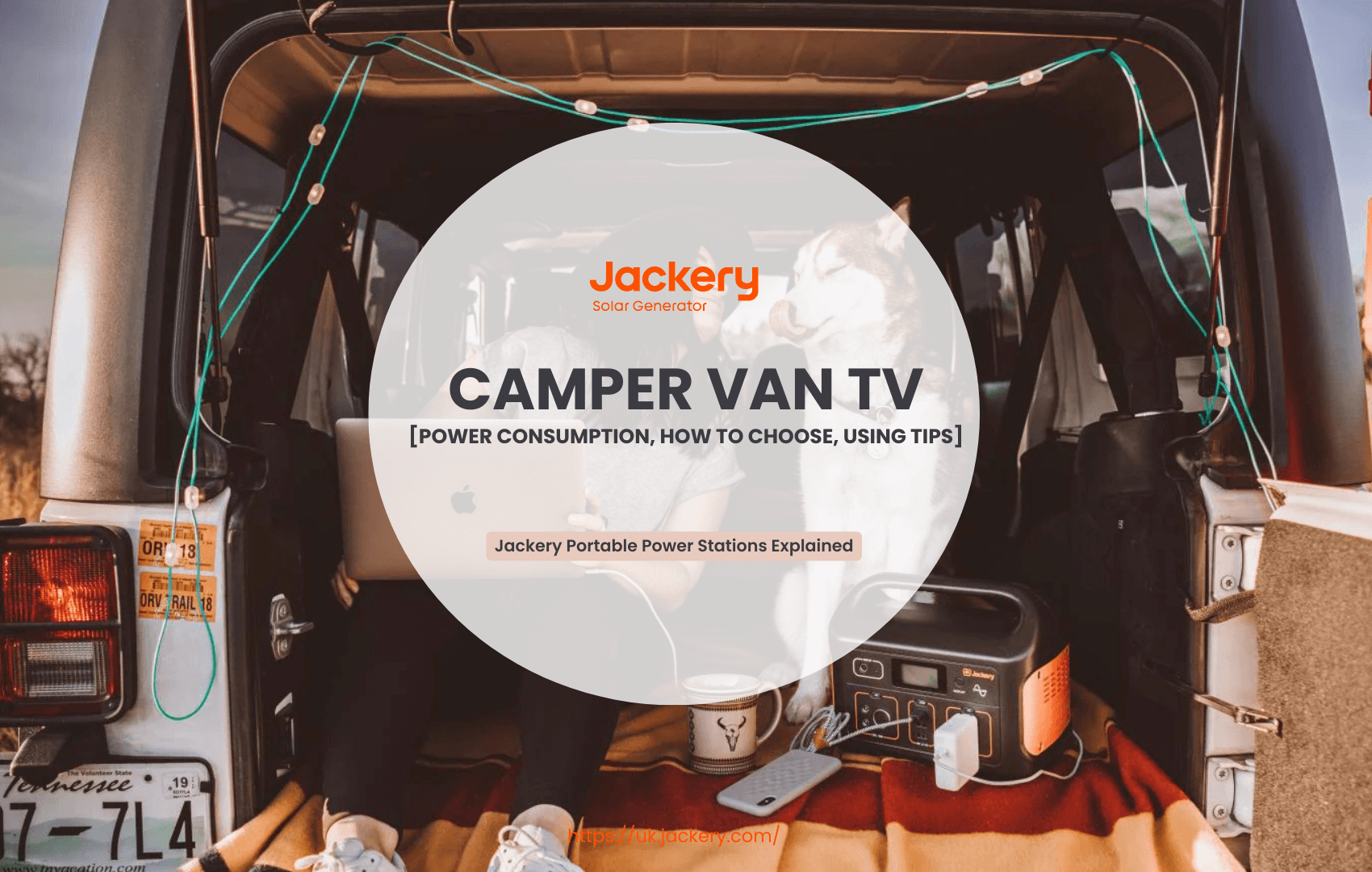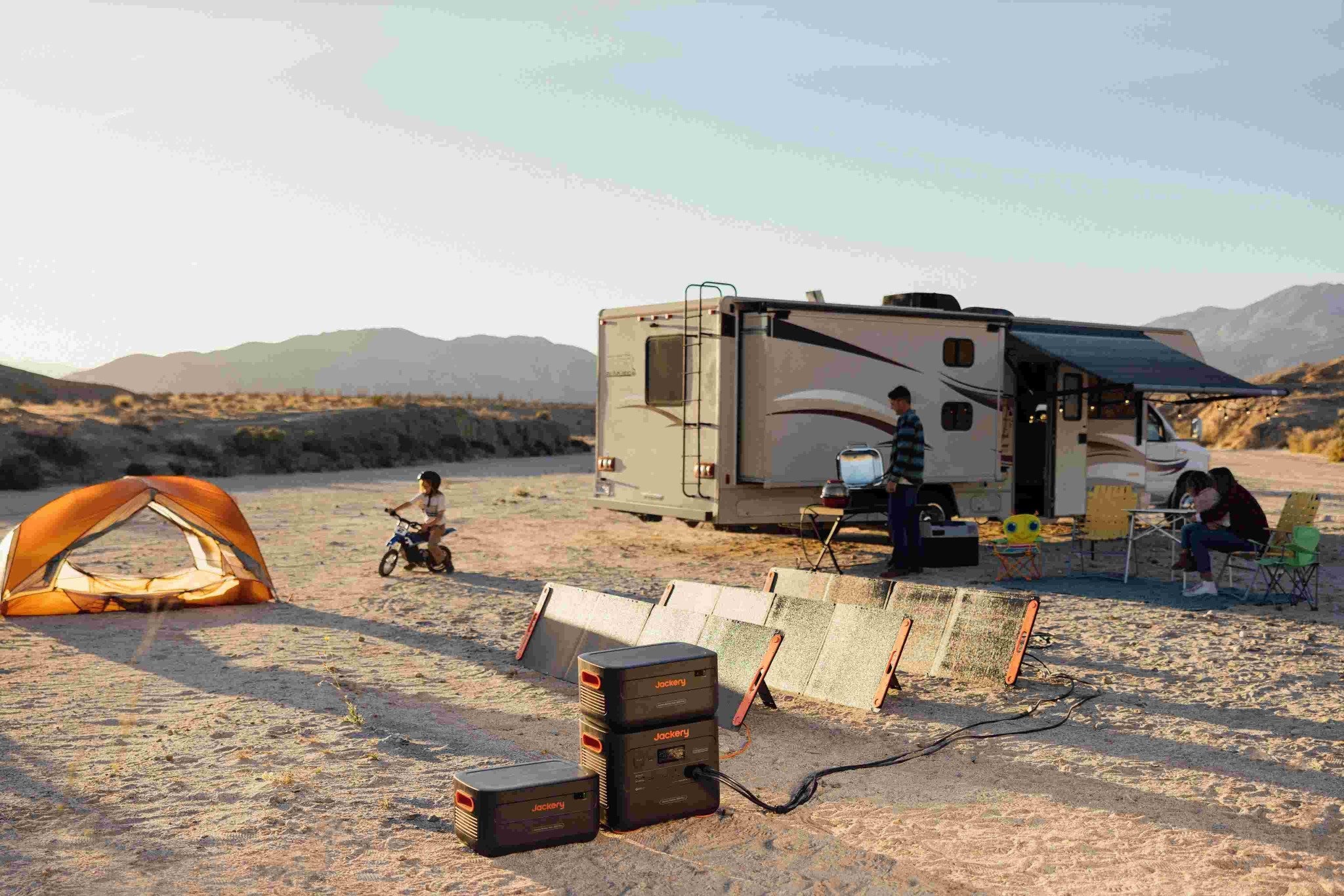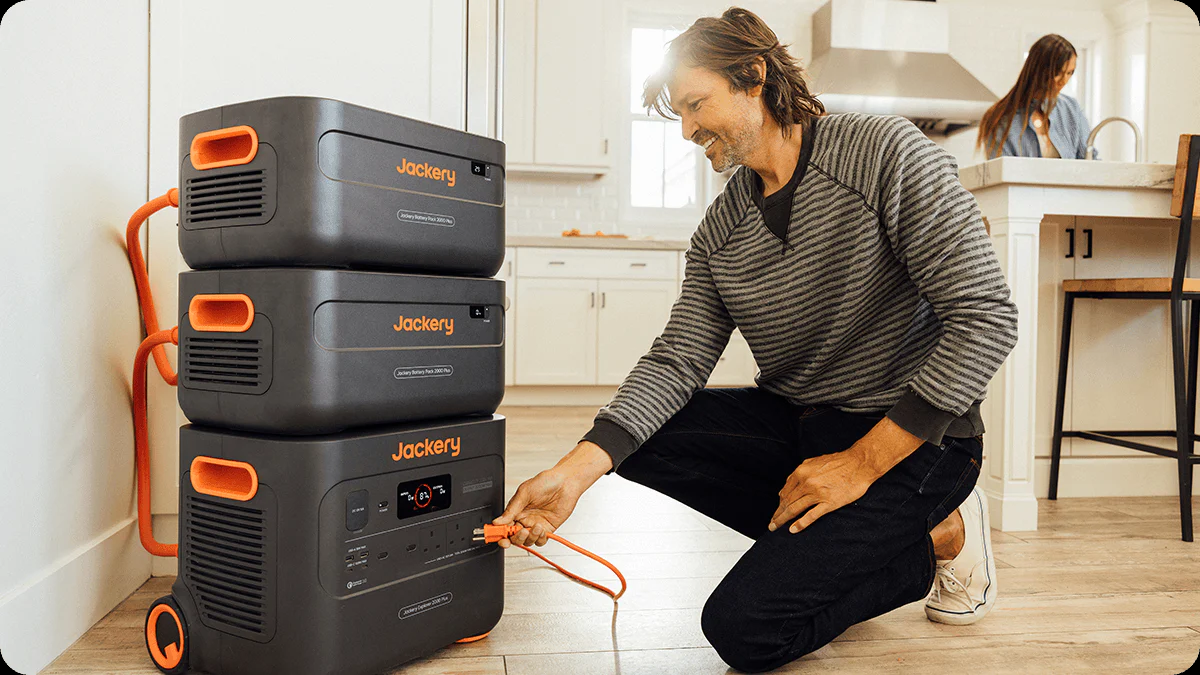Are you planning a long trip in your camper van? Entertainment is key to staying relaxed and alert during long trips. A TV in your camper van can be an extra comfort and convenience, especially when travelling with family or friends. However, choosing a camper van TV can be confusing, as many options are available. The following content will explore everything you need to know to choose the perfect TV for your camper van.
Powering the camper van TV is another subject. Except for the hookups in the camper van, we highly recommend a portable power supply, such as Jackery Portable Power Station or Jackery Solar Generator to power the TV and other appliances in your camper van. Due to its higher capacity and quiet operation, it is your best companion for your trip without any noise and fumes, especially compared to traditional generators.
|
Key Takeaways: |
|
- It is possible to use a regular TV in a camper van. When purchasing a camper van TV, carefully weigh the size, performance, mounting method, signal reception, price, and brand. - To calculate the power consumption of a camper van TV, you first need to understand its voltage, current, and operating time. - The TV can be powered by installing solar panels on the roof of the camper van. Satellite systems are reliable for receiving +TV signals in a camper van. - Smartphones, tablets, laptops, and projectors can all be used as alternatives to camper van TVs. - Besides mains electricity, electric cookers can be powered by solar, wind, fuel cells, and generators. We highly recommend Jackery Explorer 1000 v2 and 1000 Plus for powering your TV and other camper van appliances with portable power. |
Can You Use Regular TVs for Camper Vans?
Using a regular TV in a camper is possible, but certain conditions and regulations must be met. The following will analyse the feasibility of this in detail.
Power Supply
First, a regular home TV (AC) cannot be powered by a 12V camper battery. Camper van TVs usually support multiple power input methods, including 12V DC and AC. Therefore, if you want to use a home TV in a camper, plug it into shore power (a standard home power outlet) or a battery inverter. However, you can also power a regular TV using a generator or solar panels.
Size and Weight
The TV in a camper should be small and light to fit the limited space. The typical size of a camper van TV is 19 inches to 27 inches. In contrast, regular home TVs range from 32 to 85 inches and are generally heavier.
Durability and Shock Resistance
Camping TVs usually have higher durability and shock resistance to cope with the bumps and vibrations that the camper may encounter while driving. Ordinary home TVs do not need to consider shock resistance (they are usually used in a fixed environment), and the durability requirements are relatively low.
In short, it is feasible to use ordinary TVs in camper vans. However, there are apparent differences between camper van TVs and ordinary home TVs. Therefore, when buying, you should make a suitable choice based on your actual needs and usage environment.
What Should You Consider When Buying a Camper Van TV?
When buying a camper van TV, several factors must be considered to ensure you get the best fit for your needs.

Size
Ideally, choose a medium-sized camper van TV that offers good picture quality and is easy to carry. A 22-inch screen perfectly balances taking up too much space and sacrificing viewing pleasure.
Performance Requirements
The camper van TV needs to be durable and protected to cope with the various challenges of the outdoor environment. For example, most people will choose a camper van TV with waterproof, dustproof, and shockproof features. At the same time, please pay attention to its heat dissipation performance.
Mounting Method
Considering the camper van's bumps during driving, the TV must be mounted firmly and reliably to ensure it will not shake or fall off. Camper van TV installation methods are also more flexible and diverse. They can be installed on the car's wall, tabletop, or rotatable bracket for viewing at different angles and positions.
Signal Reception
Try to choose a camper van TV with multiple signal reception functions (such as cable, terrestrial waves, etc.) to ensure that straightforward TV programs can be received in different locations. Some high-end camper van TVs also have built-in satellite TV receivers or streaming services, which are convenient for receiving TV signals or watching online content in remote areas.
Price and Brand
Well-known brands usually offer better product quality and after-sales service, but their prices may also be relatively high. Therefore, please weigh the pros and cons when buying and choosing a cost-effective product that fits your budget and needs.
How Much Electricity Does a Camper Van TV Use?
As an essential entertainment device during the journey, the power consumption of the camper van TV is one critical indicator that campers pay attention to. Knowing how to calculate the power consumption of a 12V TV can help you better manage power resources and effectively extend your camping time.
To calculate the power consumption of a camper van TV, you first need to consider several key factors, including voltage, current, and operating time. You can check the specifications or device label of the camper van TV to find its operating voltage (usually 12V) and current (in amperes A).
Here are the detailed steps to calculate the power consumption of a camper van TV:
Step 1: Calculate the Electrical Power
Multiply the camper van TV's voltage and current to get its electrical power in watts (W).
Power (W) = Voltage (V) × Current (A)
Step 2: Calculate the Power Consumption
Determine the camper van TV's usage time in hours, multiply the power by the usage time, and then convert the power consumption to watt-hours (Wh).
Power consumption (Wh) = Power (W) × Time (h)
Step 3: Convert to kWh
Household electricity is usually measured in kilowatt-hours (kWh), so you must convert watt-hours to kWh. To convert power consumption to kilowatt-hours (kWh), a standard unit for household electricity, you can divide watt-hours (Wh) by 1000.
Power consumption (kWh) = Power consumption (Wh) ÷ 1000
Example: Assuming that your camper van TV has an operating voltage of 12V and an operating current of 2A (the specific current value should refer to the TV's specifications), and you plan to use it for 4 hours a day, how much electricity will this TV consume per day?
Power (W) = 12V × 2A = 24W
Power consumption (Wh) = 24W × 4h = 96Wh
Power consumption (kWh) = 96Wh ÷ 1000 = 0.096kWh
Therefore, this camper van TV will consume 0.096kWh of electricity per day.
How to Power a Camper Van TV?
Watching TV is one of the most popular ways to relax when camping. However, you may run into some problems when using a camper van TV. For example, many people wonder how to power a camper van TV. Generally, there are various ways to power a camper van TV.
Here are a few ways to power a camper van TV:
Built-in Battery
Most campers are equipped with a built-in 12-volt DC battery system, the most basic way to power a camper van TV. This built-in battery system usually has multiple USB output ports for low-voltage power and can be replenished by driving or mains charging.
Camp Power
In camps equipped with power, you can use the camp power to power the camper van TV. Just connect the camper to the camp's power socket. However, not all camps provide power facilities, so you need to know in advance when choosing a camp.
Generator
Consider using a portable generator to power the TV. The generator (usually a fuel generator) should be placed in a well-ventilated area to avoid the risk of carbon monoxide poisoning. In addition, when using a generator, you need to pay attention to noise and exhaust emissions to ensure that it complies with the camping site's regulations.
Solar equipment (solar generators/panels) can power outdoor and indoor electrical appliances, such as camper van TVs, with sufficient sunlight. Generally, solar generators are light, easy to carry, and do not take up much space.

However, the weather dramatically affects solar panel charging efficiency, and the charging effect is not good on cloudy days or at night. The Jackery Portable Power Station is a portable generator that can combine with Jackery Solar Panels as the solar generator to charge appliances with solar energy. Also, it can be recharged by wall outlets and carports when there is no sufficient sunlight, especially in the UK.
Jackery Portable Power Stations are characterised by their lightweight design and portability—they are 30% lighter than comparable products. They feature a foldable handle for convenient transport, allowing users to charge devices while on the go. These durable portable electric generators can power 99% of appliances, including camper van TVs.
Solar Panels
Solar panels are quiet and pollution-free, especially suitable for use in sunny areas. However, their efficiency is greatly affected by weather and light conditions.
Mobile Power
You can use a large-capacity mobile power bank (power bank) to power small TVs or portable TV devices. However, mobile power is limited and only suitable for short-term or emergencies.
|
Type |
Advantages |
Disadvantages |
|
Built-in Battery |
• Simple and convenient operation • Relatively stable power supply |
• Limited battery capacity • Long charging time |
|
Camp Power |
• Stable and continuous power supply • Sufficient power |
• Depends on camping facilities • Extra cost (usually) |
|
Generator |
• Sufficient power • Simple operation |
• Noisy • Environmentally polluting |
|
Solar Panel |
• Environmentally friendly and energy-saving • No noise |
• Highly affected by weather • High initial investment • Occupies an ample space |
|
Mobile Power |
• Easy to carry and move • Not restricted by location |
• Limited capacity • High charging frequency |
Therefore, you can choose one or more power supply methods that fit your needs and situation to ensure you can enjoy a high-quality TV entertainment experience outdoors.
Jackery Portable Power Stations for Camper Van TVs
Portable power stations are advantageous for camper van TVs as they supply electricity without a power infrastructure. They can power various gadgets, including kettles, phones, cameras, etc.
A Jackery Portable Power Station is a small, battery-powered gadget that lets you get power on the go. It has AC, DC, and USB ports to run most home and outdoor appliances and smartphones. It's quieter than gas engines, doesn't emit pollution, and can be charged by solar panels, wall outlets, or car chargers.
These portable battery chargers, equipped with ChargeShield technology, safeguard gadgets against voltage fluctuations. They are engineered for outdoor resilience and feature a 94V-0 fire rating and superior shock resistance.
Jackery Explorer 1000 Plus
The Explorer 1000 Plus features an impressive 1264Wh durable LiFePO4 battery and a 2000W full-power pure sine wave inverter, supplying sufficient energy for almost all essential devices. Remarkably, it can augment its capacity to 5kWh by incorporating up to three more battery packs.
Employing Jackery's exclusive technology, the Explorer 1000 Plus's capacity can be augmented from 1.26kWh to 5kWh by adding up to three supplementary battery packs. Furthermore, it features a maximum output of 2000W, exceeding the standard 1kWh LFP power plants by 20%. It can charge a camping kettle (750W) for 1.3 hours.
The MPPT technique guarantees 99% efficiency in solar charging. A wall charge from 0% to 100% of the battery requires 100 minutes, while solar charging with four SolarSaga 200W solar panels takes 2 hours. With automobile charging capabilities, you will no longer need to worry about depleting power while outdoors.
The LiFePO4 battery system is secure and durable, equipped with a proprietary BMS (Battery Management System) that includes integrated protections. After 4,000 charge cycles, the battery retains 70% capacity, guaranteeing a lifespan of 10 years with daily charging. This yields an exceptional cycle life that is eight times longer than that of competitors.

(*The working hours are only for reference; the actual working hours depend on your usage.)
Jackery Explorer 1000 v2
First, we recommend Jackery Explorer 1000 v2 for powering electric cookers. From its capacity to its design, it is suitable as a portable power supply to provide enough electricity for small to medium household appliances.
The Explorer 1000 v2 Portable Power Station has an excellent 1500W output and 1070Wh capacity, 50% higher than the Explorer 1000. It can power high-demand items like portable space heaters, kettles, etc. Equipped with USB-A/C connections and dual PD charging up to 100W, it can simultaneously charge several devices (phone, laptop), rendering it the ideal companion for all your power requirements.
The app's Emergency Charge Mode allows the Explorer 1000 v2 Portable Power Station to be fully charged in less than an hour, offering vital power backup when the battery runs low. Moreover, charging from 0% to 100% within two hours via an AC wall outlet prolongs battery longevity.
Experience serenity with its nearly silent operation, maintaining noise levels below 22dB while energising your devices. This power station guarantees uninterrupted enjoyment during camping, work, or relaxation, so you can power your electric cookers and other electronics without noise.

(*The working hours are only for reference; the actual working hours depend on your usage.)
How Do We Solve the Signal Problem of Camper Van TV?
The signal problem of camper van TV is often a headache due to geographical location and signal reception limitations. Here are several ways to effectively solve the signal problem of camper van TV.
Online Streaming Services
Streaming requires a lot of mobile data, which may increase the cost. Freeview, for example, has a streaming application.
If there is a local mobile (or Wi-Fi) signal, you can use applications such as BBC iPlayer, ITV Hub, etc., to watch TV directly through your mobile phone or a Wi-Fi-type mobile Internet device.
Satellite
Satellite systems are usually used in large motorhomes and are reliable for receiving TV signals in camper vans. However, installing one requires a specific cost and technical support.
Terrestrial Digital TV Antenna
If the camping site is close to a city or TV signal transmission tower, a terrestrial digital TV antenna is an affordable option. For example, a DVB (digital video broadcasting) receiver and antenna will receive digital TV (Freeview) signals. However, you need to be in an area with TV reception. (Free to use, no subscription required)
To sum up, there are several ways to solve the problem of TV reception in camper vans in the UK, each with its advantages and disadvantages. Please choose the solution that suits you best. You must consider your travel route, budget, and TV program needs.
Tips for Using and Maintaining a Camper Van TV
With the correct use and maintenance skills, you can enjoy a high-quality camping entertainment experience and effectively extend the life of the camper van TV.

Tips for Using Camper Van TVs
Here are some tips to pay attention to when using camper van TVs:
Tip 1: When installing the camper van TV, choose a stable location that avoids direct sunlight.
Tip 2: When not in use, try to turn off or unplug the camper van TV to avoid energy consumption caused by long standby.
Tip 3: Ensure the camper van TV works at a suitable temperature and humidity. Excessive temperature or moisture may increase energy consumption.
Tip 4: Adjust the camper van TV to a comfortable brightness and contrast, protecting your eyesight and extending the TV's life.
Tips for Maintaining Camper Van TVs
Here are some maintenance tips for camper van TVs:
Tip 1: Clean the screen regularly. Spray a professional screen cleaner (avoid using cleaners containing alcohol or ammonia) onto a soft cloth to clean the TV screen.
Tip 2: Keep the environment dry. A humid environment is awful for electronic devices, so don't place the TV in a sealed cabinet. In damp weather, you can let the TV work daily to use the heat it generates to dissipate the internal moisture.
Tip 3: Prevent magnetic field interference. Avoid placing the camper van TV too close to other electrical appliances (such as refrigerators, stereos, etc.) because magnetic fields can easily interfere with it and affect the picture quality.
Tip 4: Carry carefully. Be careful when moving the camper or carrying the TV (especially the LCD screen) to avoid collision and vibration.
Tip 5: Check the cables and interfaces regularly. Make sure all wires and interfaces are firm and not loose. Check them regularly for signs of damage or ageing and replace them as needed.
Are There Any Alternatives to Camper Van TV?
As a traditional entertainment device, TV has a specific position in camper cars. However, with the development of technology, TV is no longer the only entertainment option in camper cars. Here are some alternatives to camper van TV:
Smartphone
Smartphones can also be used as temporary entertainment devices to enjoy music or watch videos by connecting to car audio or Bluetooth headphones. Moreover, they are portable and versatile, a benefit that other devices cannot match.
Tablets or Laptops
Tablets and laptops are light and easy to carry, but they can also serve various entertainment needs, such as watching movies, playing games, or surfing the Internet.
Tablets usually have enough battery life to support several hours of entertainment and can be charged by car or mobile power. Some tablets or laptops are even equipped with portable solar charging panels, which allow them to be used for a long time without power.
Projector
Compared with camper van TVs, projectors can not only have a larger screen size but also allow you to create a home theatre-like experience inside or outside the camper. In addition, modern projector technology is very mature. For example, many portable projectors support HD or 4K resolution, can connect to Wi-Fi, and watch streaming content.
Camper Van TVs FAQs
The following are the frequently asked questions about camper van TV in the UK:
1. What is the best way to watch TV in a camper van?
If your campsite has Wi-Fi coverage, it's also very convenient to use a streaming device such as a smart TV box or tablet to watch online videos through Wi-Fi. In addition, it is also a good choice to carry an efficient outdoor TV antenna, especially in areas with strong signals, to receive terrestrial digital signals and watch free local TV programs.
2. What types of camper van TVs are there?
Thanks to today's rapidly developing technology, there are many options for camper van TV. These include:
Smart TV (it can use streaming services if there is an Internet connection.)
Satellite TV (using an antenna)
Bright satellite hybrid TV (including innovative features and built-in satellite decoder)
3. Can I use a standard TV in a camper van?
You can use a standard TV in a camper van if you have reliable power, signal reception, and inverter and follow relevant regulations. However, remember that regular TVs are designed for fixed use at home and may not be as energy-efficient as 12V camper van TVs. Home TVs are more fragile than those designed for RVs.
Final Thoughts
Having a TV in your camper van can enhance your travel experience in camper van adventures. Whether a casual camper or a full-time nomad, a well-chosen camper van TV can keep you entertained on a rainy day or have a cosy movie night under the stars. And with the detailed analysis of this guide, you can choose the most suitable camper van TV even when faced with so many choices.


































































































